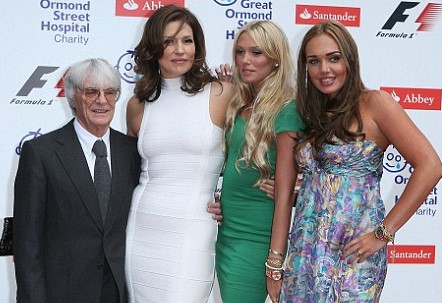Billionaire Bernie Ecclestone gets $100 million a year from his ex-wife Slavica
 |
| Bernie Ecclestone (L) with his foot taller ex-wife Slavica and their two daughters. Bernie is always 5 moves ahead of his adversaries and the governments who try to take him down. |
For most billionaires, the greatest fear in getting married is what the divorce might cost. Not so Bernie Ecclestone. Official court papers show the formula one tycoon is, as a result of his split from his second wife Slavica, perhaps the world's best kept man.
Documents show that since his divorce in 2009 he has received $US500 million ($540 million) from his ex-wife's trust fund. In a highly unusual divorce settlement, rather than Mr. Ecclestone paying Slavica Ecclestone a good chunk of his fortune, she appears to be paying him at the rate of $US100 million a year.
The details of the divorce settlement are disclosed in a 256-page indictment, laid before a German court last week. Mr. Ecclestone is currently on trial in Munich, where he is accused of paying a more than £25 million ($45 million) bribe to a German banker.
The indictment states; "Since his divorce from his wife, the accused has received payments on the basis of the British decree nisi. The payments amount to around $100 million a year. The duration of the payments from the divorce decree is not known."
Mr. Ecclestone, 83, was married to Slavica, his second wife, for 24 years until their divorce in 2009 on the grounds of his "unreasonable behavior". He married his third wife, Fabiana Flosi, 36, in 2012.
When he and Slavica – who is 28 years his junior and at 6ft 2in, almost a foot taller – divorced five years ago, it had widely been assumed that she was in receipt of the biggest divorce settlement in history.
Reports suggested that she had been given more than a billion dollars in a deal agreed behind closed doors. The truth, as with much of Mr. Ecclestone's affairs, is more complex. According to the indictment, the details of the divorce settlement were given to the German prosecutors in testimony from Frederique Flournoy, a director of the Ecclestones' Bambino trust.
The family trust is based in the tax haven of Liechtenstein and its beneficiaries are Mr. Ecclestone's ex-wife and their two daughters Tamara and Petra. It was set up in 1997 and is thought to be worth more than £2.4 billion.
Mr. Ecclestone's assets were transferred into his wife's name in the 1990s at a time when he faced heart problems. Slavica had not lived in the UK long enough to be domiciled for tax purposes and, had he died, she would have had to pay 40 per cent inheritance tax on money received from him. Normally, spouses are exempt from this.
To prevent his income from being taxed, Mr. Ecclestone transferred his most valuable assets, the entire share capital of F1's parent company, to a Jersey-based business called Petara which was ultimately owned by his ex-wife. She then put the shares in the offshore Bambino trust, meaning no tax has been paid on the money raised by his 2006 sale of F1 to a private equity firm.
The catch is that, as a UK resident, Mr. Ecclestone is not allowed control over the trust, otherwise he risks an inquiry and hefty tax bill. The set-up led to the unusual divorce settlement in which the trust paid out to Mr. Ecclestone. What Mr. Ecclestone has been doing with his £60 million a year trust payments is not clear.
While generous to his children, Mr. Ecclestone, the Depression-era son of a Suffolk trawlerman, is known to count every penny. He is said to own a number of private jets, a chalet in Gstaad and a 190ft yacht. But those were assets acquired before his divorce. He lives in an apartment, described as modest in some quarters, above his office overlooking Hyde Park in central London and still works five days a week.
Julian Ribet, a partner at Levison Meltzer Pigott, leading specialist family law firm, said: "Unsurprisingly, given the circumstances of the individuals in this case, the structure of this settlement would appear to be unusual. Typically, a wealthy husband would be making payments to his wife, if he holds the majority of the assets. However, where an individual has a financial 'resource', such as regular income from a trust fund, this can be taken into account when deciding which party should make payments.
"Settlements like these are very complicated and need to be very carefully structured. One would expect high net worth individuals like Bernie and Slavica Ecclestone to have received the best legal and tax advice in several countries to ensure their divorce settlement is arranged in the most tax efficient way possible."
The Bambino trust is at the centre of the German case. Prosecutors have accused Mr. Ecclestone of bribing Gerhard Gribkowsky, a banker, to act against the best interests of his employer and ensure F1 was sold to a company that had pledged to keep Mr. Ecclestone as chief executive. The money came from Mr. Ecclestone and the Bambino trust.
In his defense, launched last week, Mr. Ecclestone denied bribing Mr. Gribkowsky, claiming the former banker had blackmailed him by threatening to supply false information about the Bambino trust to the tax authorities.
Mr. Ecclestone's defense claims the £26 million was hush money and has branded the accusations against him "incorrect, misleading and incoherent". The hearing will reconvene on Friday. The Telegraph
